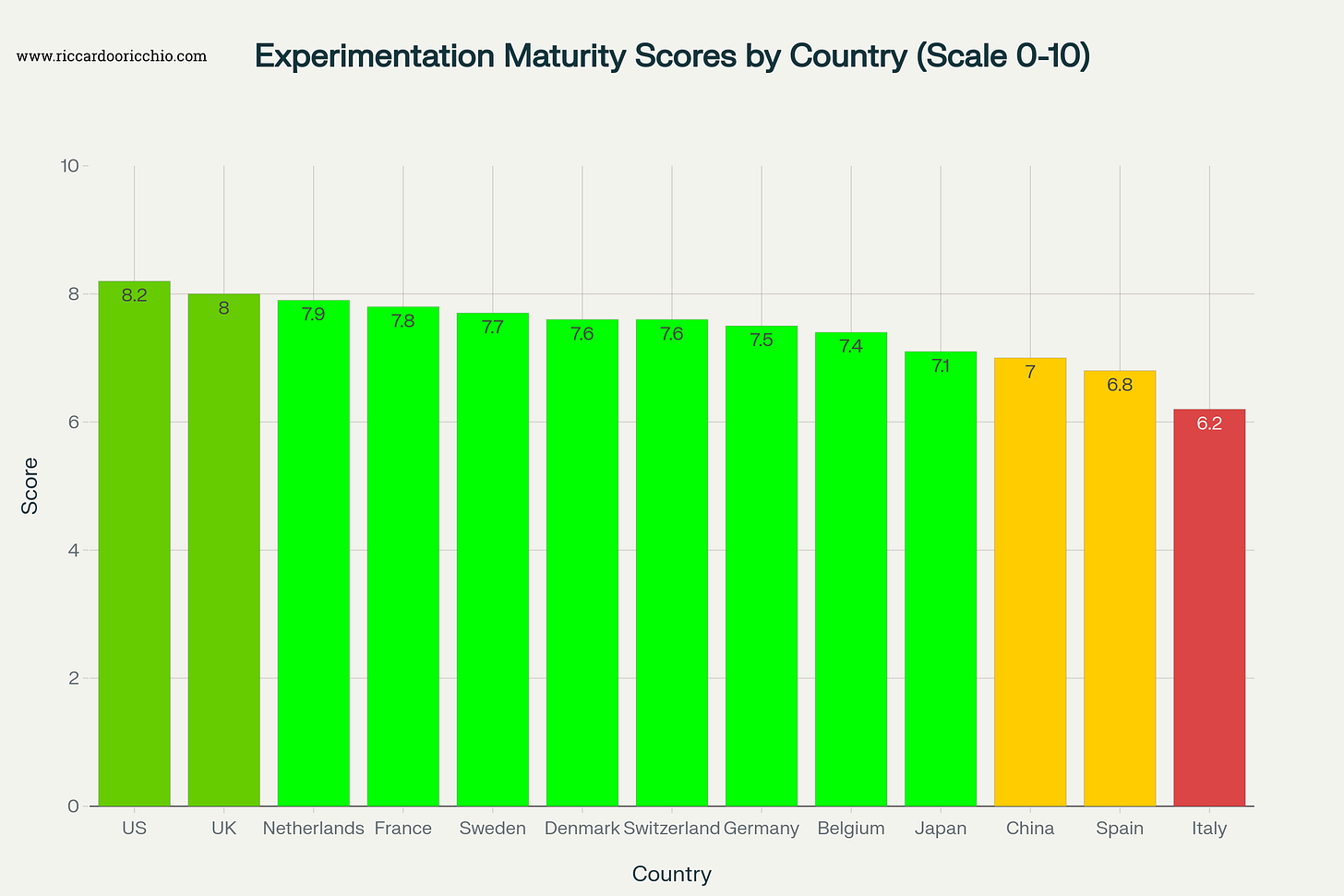Why is Italy so behind with Experimentation?
Overview of Experimentation Maturity Level (EML) across the main countries with a focus on Italy
Experimentation is a key driver for innovation, optimization, and business growth.
However, the maturity of experimentation practices varies significantly across countries.
This blog explores the Experimentation Maturity Level (EML) across the main countries, with a particular focus on Italy’s position and challenges.
What is the Experimentation Maturity Level (EML)?
Experimentation Maturity Level refers to how systematically and effectively businesses implement structured testing processes, such as A/B testing and multivariate testing, to improve products, services, and customer experiences.
How it is calculated
Calculating the Experimentation Maturity Level (EML) of a country is a complex task that involves analyzing multiple sources of data, including industry reports, digital maturity indexes, conversion rate optimization benchmarks, and innovation surveys, which do not fully exist on the web right now.
To address this, I submitted diverse data sources to AI, which analyzed and synthesized them, and estimated an overall Experimentation Maturity Score for each Country.
Within the sources, there were authorities like the Experimentation Maturity Program Reports 2025 by Speero, the Experimentation Program Maturity Report by VWO, and many more.
This AI-driven approach provides an approximate assessment of how advanced experimentation practices are across different regions.
EML Score Parameters
The Experimentation Maturity Level score ranges from 0 to 10, where 0 represents a very low level of experimentation maturity and 10 represents a very high level.
Experimentation Maturity Scores by Country
According to AI’s analysis, globally, countries such as the United States, the United Kingdom, the Netherlands, and Sweden stand out as leaders in experimentation maturity.
These nations benefit from a combination of strong organizational cultures that prioritize data-driven decisions, huge investments in digital technologies, and talent pools skilled in conversion rate optimization (CRO) and experimentation frameworks.
Their high experimentation maturity scores reflect not only the adoption of advanced testing methodologies like A/B and multivariate testing but also systematic integration of experimentation into business strategies.
Companies in these countries often have dedicated teams, comprehensive tools, and processes for continuously running, analyzing, and learning from experiments to drive innovation and optimize customer experiences.
The maturity scores also highlight variable factors such as government digitalization initiatives, academic-industry collaborations, and sector-specific innovation strengths. For instance, the United States leads due to its robust tech ecosystem and large-scale digital businesses, while European countries like the Netherlands and Sweden excel through coordinated national and regional policies fostering digital transformation.
Italy’s Experimentation Maturity Level
(Not so) Surprisingly, according to the AI’s analysis, Italy is at the bottom of the table.
Italy’s experimentation maturity is on a growth trajectory, but still lags behind leading countries known for advanced digital and innovation ecosystems.
Italian businesses are gradually embracing structured experimentation techniques, aided by increased awareness of CRO benefits.
However, consistent application remains limited. The workforce often shows skill shortages in areas critical for experimentation, such as user research, statistical rigor, and experimentation design. These gaps prevent the scalability and integration of testing practices into broader organizational cultures.
Why the Italian EML is so behind?
From my personal experience and what I see day by day, I can confirm that Experimentation and CRO don’t get the same relevance as other areas like SEO, PPC, and email marketing.
The reality is that Experimentation and CRO are silently integrated into all those disciplines, but when it comes to budget definition, it often stays in the background.
Here are the reasons why, in my opinion.
Why #1: Lack of awareness
A significant portion of marketing professionals and business leaders in Italy still lack a clear understanding of what experimentation truly entails. Many are unfamiliar with fundamental concepts such as user research, hypothesis formulation, and statistical analysis.
Without this awareness, experimentation remains an abstract tactic rather than a core element of strategic planning.
This knowledge gap prevents motivation to adopt experimentation programs or allocate resources towards them.
Why #2: Lack of investment
Experimentation often falls low on the priority list when companies define budgets. The lack of dedicated funding restricts the deployment of tools, hiring of specialized professionals, and scaling of testing methodologies.
Moreover, the Italian job market offers very few open roles explicitly focused on experimentation or conversion rate optimization.
This scarcity of investment and talent creates a cycle where experimentation programs struggle to gain traction and prove their value.
Why #3: Lack of dedicated communities
Unlike other countries with vibrant ecosystems supporting experimentation, Italy has a noticeable absence of large, active communities centered around experimentation and CRO. These communities are essential for sharing best practices, mentoring newcomers, and spreading awareness.
This lack of collaborative networks slows cultural adoption and innovation diffusion.
Conclusion
Italy’s journey toward higher experimentation maturity presents both challenges and opportunities.
To bridge the gap with leading countries, a concerted effort is needed to raise awareness, increase investment, and build vibrant communities dedicated to experimentation and CRO.
As a specialist in Conversion Rate Optimization (CRO), I understand the critical role experimentation plays in driving growth and innovation.
Feel free to share your experiences, insights, or questions in the comments and get in touch with me.
Together, we can foster a stronger culture of experimentation in Italy and beyond, unlocking its full potential.
Happy experimenting!


